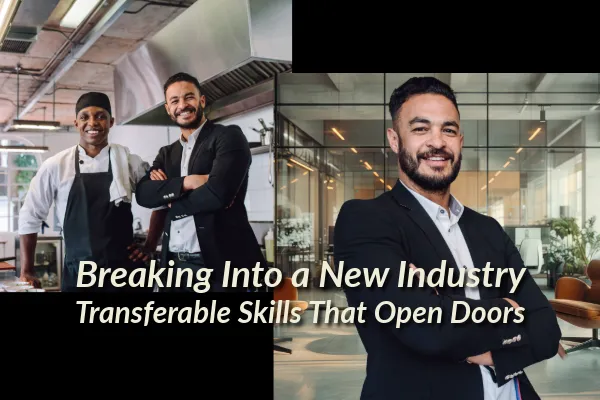
Breaking Into a New Industry: Transferable Skills That Open Doors
REFRAME — You’re Not Starting Over. You’re Repackaging Value.
The biggest myth about changing industries? That you have to start from scratch.
You don’t. You’re not a rookie—you’re just switching arenas.
The truth is, you already have the tools—you just need to label them differently.
Case in point: Marcus spent 15 years managing a busy restaurant and wanted to move into corporate project coordination. He assumed he’d be overlooked because he didn’t have “office experience.” But when we dug in, it turned out he’d been running complex projects every single day—just in a different setting.
His “daily staff scheduling” became “resource planning.”
His “opening and closing checklists” became “process management and quality control.”
His “handling customer complaints” became “stakeholder communication and conflict resolution.”
His “training new servers” became “onboarding and performance development.”
Once he reframed his experience around outcomes instead of job titles, his résumé stopped looking like food service—and started reading like operations leadership. Within two months, he was hired by a logistics company to coordinate national client projects.
He didn’t start over. He simply learned to describe what he’d always been doing in a way that made sense in a new environment.
Your résumé isn’t a list of old jobs—it’s a record of transferable wins. Employers hire results, not résumés.
REFOCUS — Translate, Don’t Transplant.
Instead of listing what you’ve done, describe what those actions mean in your new world.
Here’s your simple four-step translation checklist:
Name the universal skill. Think leadership, communication, problem-solving, organization, adaptability.
Show measurable impact. Replace titles with outcomes: “cut turnaround time by 30%,” “trained 12 new employees.”
Use their language. Scan five job postings in your target field and circle recurring terms. Mirror that language in your résumé and LinkedIn.
Tell one crossover story. In interviews, share a specific example of how you solved a problem that looks like theirs—just in a different context.
Pro move: conduct a 20-minute informational interview with someone already in the field. Ask, “What problems keep you up at night?” Then connect your past results directly to those pain points. That’s how you bridge credibility gaps.
REIGNITE — Build Momentum One Door at a Time.
Breaking into a new industry isn’t about applying everywhere. It’s about building strategic proof one connection, one project, one conversation at a time.
Try these moves this week:
Show up where they gather. Join one online community or LinkedIn group specific to your target industry. Engage—don’t pitch.
Volunteer or consult short-term. A three-month project in your new space beats another course on your résumé.
Tell the evolving story. Update your LinkedIn headline to reflect the bridge:
“Operations Leader → Transitioning to Project Coordination | Bringing 15 Years of People and Process Management to Business Operations.”
Do that, and you’re not “breaking in.” You’re already standing in the doorway.
7-Day Challenge
Each day this week, write down one transferable skill and one proof story behind it. By day seven, you’ll have a mini-portfolio you can use for résumés, interviews, and LinkedIn posts. Momentum loves evidence.
Bottom Line
You’re not changing who you are—you’re changing the context that sees your value.
👉 Book a discovery call with Kole:https://schedule.theunshakablemind.net/widget/bookings/discovery-call-with-kole
